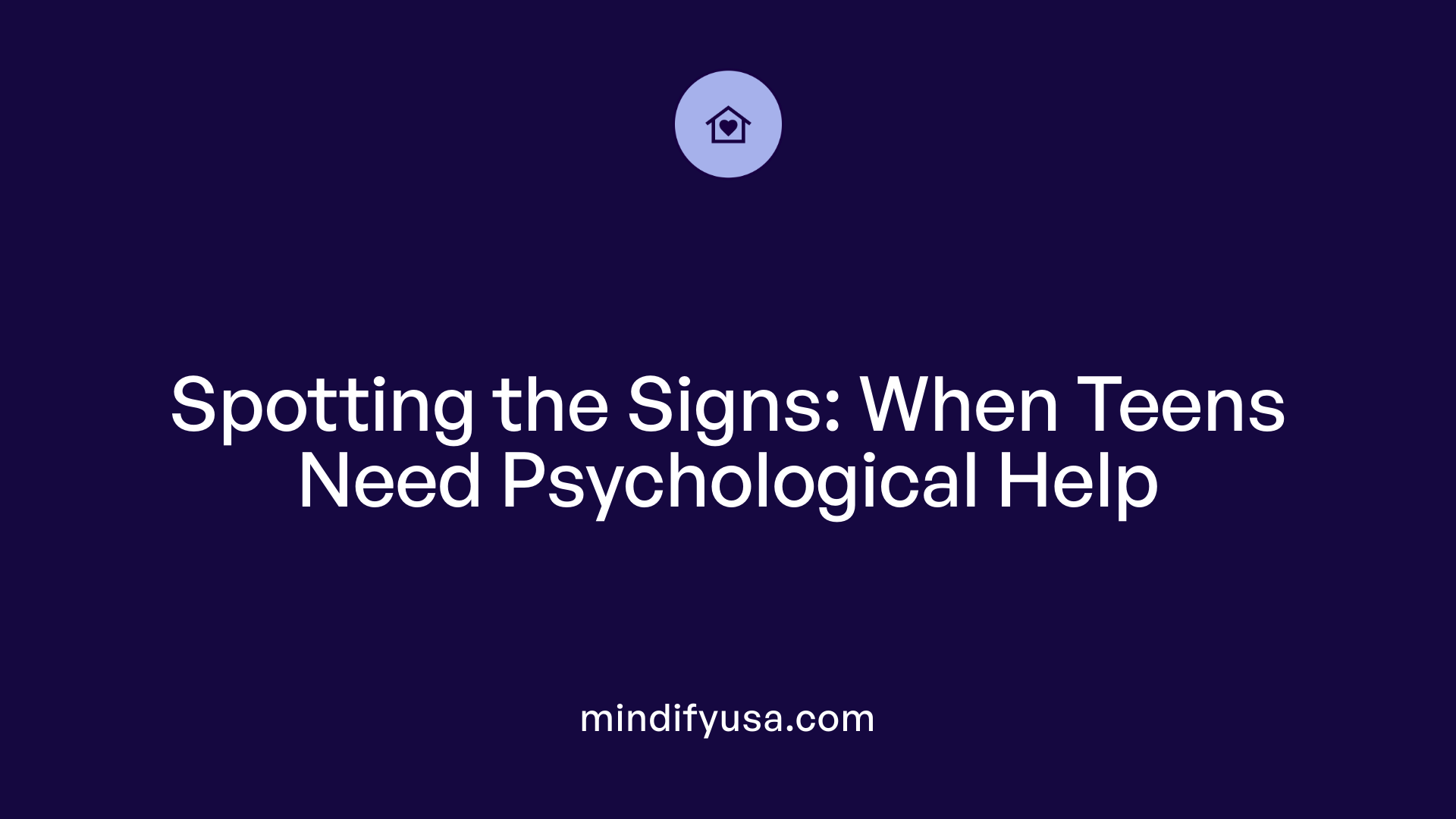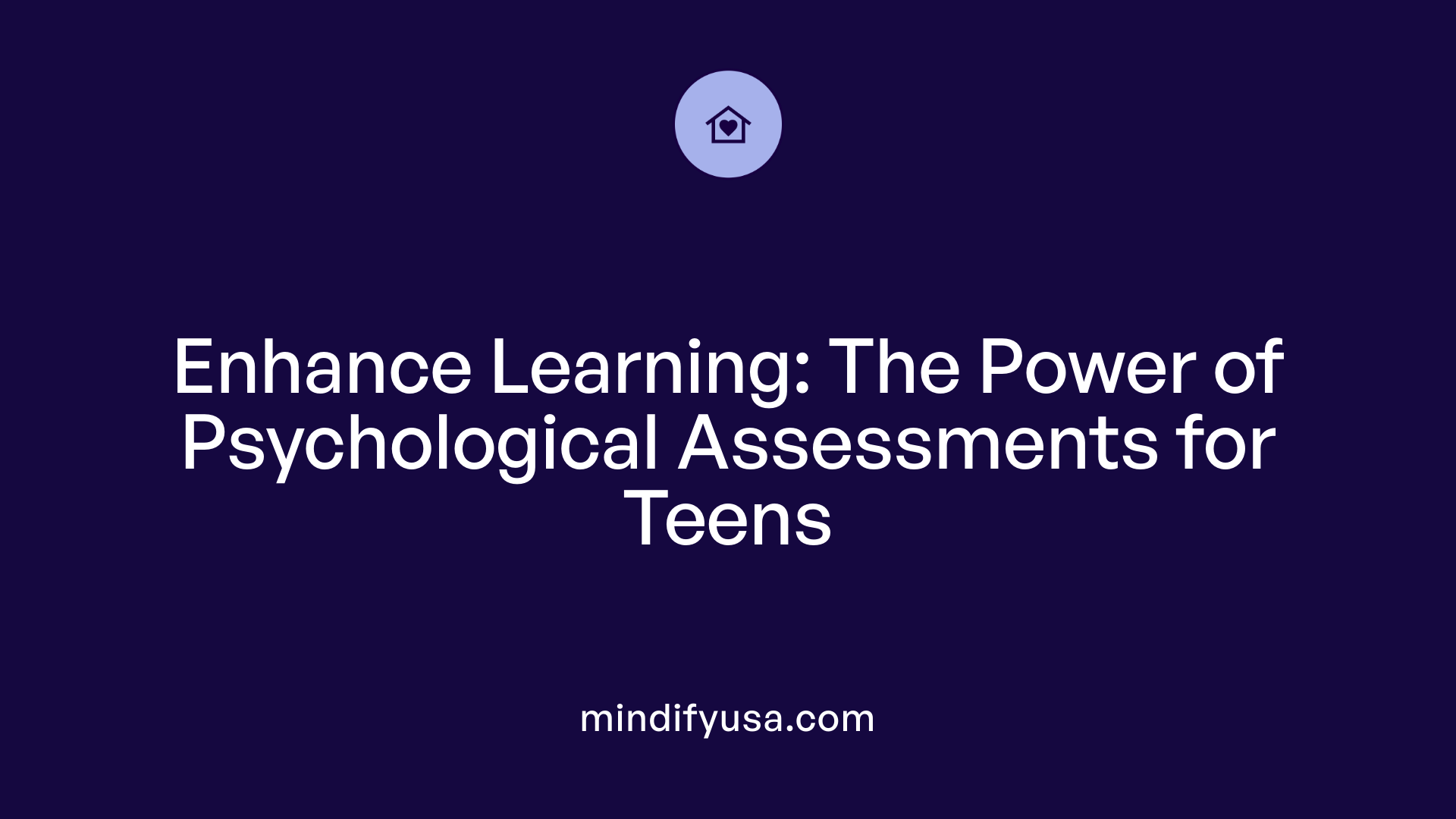Understanding When Your Teen Might Need Professional Help
Adolescence is a period of significant development, marked by physical, emotional, and social changes. While many teens navigate this phase smoothly, some exhibit signs that suggest underlying mental health concerns. Recognizing these signs early and seeking psychological testing can be vital for providing appropriate support and intervention. This article explores the key indicators that a teenager might benefit from a psychological assessment, the process involved, and the benefits such evaluations offer.
Behavioral and Emotional Changes as Indicators

Why might a teenager need a psychological assessment?
A teenager may require a psychological assessment if they show sudden or significant changes in behavior that are unusual for them. Examples include withdrawal from friends and family, intense emotional distress, or aggressive actions. Signs such as severe anxiety, depression, nightmares, or expressions of suicidal thoughts are especially concerning and should prompt professional evaluation. These assessments help identify underlying conditions like depression, anxiety disorders, eating disorders, or trauma, and assist in developing targeted treatment plans. Early diagnosis through evaluation allows for timely intervention, which can significantly improve a teen's mental health, support their development, and help prevent more severe issues in the future.
What signs indicate that a teen may need a mental health assessment?
Certain behaviors and emotional states can warn parents, teachers, or caregivers that a teen might need professional help. These include noticeable mood swings, irritability, or feelings of hopelessness that last for days or weeks. Withdrawal from peer groups, family, or activities they previously enjoyed is another red flag. Significant changes in sleep patterns, eating habits, or academic performance are also indicators. Additionally, red flags include signs of self-harm, talk of suicide, substance use to cope, or difficulty managing daily emotions. Obsessive behaviors or social withdrawal can further point towards underlying mental health concerns. If such signs are observed, an assessment by a mental health professional is advisable to ensure early support and intervention.
What are the benefits of psychological testing for teens?
Psychological testing offers numerous benefits by providing an objective assessment of a teen’s mental and emotional health. It helps identify issues like ADHD, anxiety, autism spectrum disorders, or developmental delays that might be impacting their daily functioning. The assessment results guide clinicians in creating personalized treatment and educational plans tailored to the teen’s specific needs. Moreover, testing can track progress over time, inform decisions about medication or therapy, and facilitate better communication between teens, parents, and educators. Ultimately, psychological testing fosters greater understanding, reduces stigma around mental health, and empowers teens with insights into their strengths and challenges, improving their overall well-being.
What can be learned from psychological testing in adolescents?
Psychological testing in adolescents provides comprehensive insights into their cognitive, emotional, and behavioral functioning. It helps diagnose mental health conditions such as depression, anxiety, or ADHD that might not be obvious through casual observation. Testing can reveal learning disabilities, social skills, and emotional regulation issues while establishing a profile of the teen’s strengths and weaknesses. These insights inform personalized intervention strategies, educational accommodations, and appropriate therapy options. The assessments enable early detection of problems, fostering better long-term outcomes. They also help in understanding individual differences, supporting adolescents in achieving academic success, building social relationships, and managing emotional challenges effectively.
What should I expect from psychological testing for a teen?
The process of psychological testing for a teen involves multiple steps conducted by trained mental health professionals. It generally begins with an initial interview with the teen and their caregivers to gather background information. The teen then completes various questionnaires and standardized tests that evaluate cognitive abilities, emotional health, personality traits, and social skills. The tests can measure intelligence (IQ), academic skills, attention, memory, and emotional states. Observations and behavior checklists may also be included. Results are analyzed to identify underlying issues like depression, anxiety, ADHD, or learning disabilities. After testing, a feedback session is held to discuss the findings, recommend treatments, or educational adjustments. Overall, the process provides valuable insights to support the teen’s growth and mental health.
The Role of Developmental and Cognitive Assessments
Why might a teenager need a psychological assessment?
A teenager might require a psychological assessment when noticeable changes occur in their behavior or emotions. These can include withdrawal from friends or family, sudden mood swings, or acting out aggressively. Such shifts can signal underlying issues like depression, anxiety, trauma, or other mental health conditions.
Severe anxiety, persistent sadness, nightmares, or talk of self-harm and suicide are especially urgent signs. Early evaluation helps clinicians identify the root causes and develop appropriate treatment plans, which could involve therapy, medication, or additional support. Conducting these assessments earlier can significantly improve a teen’s mental health and developmental trajectory.
Psychologists and psychiatrists use various tools to diagnose conditions like depression, anxiety disorders, eating disorders, and behavioral issues. These evaluations enable targeted intervention, fostering better emotional regulation and resilience in adolescents.
What signs indicate that a teen may need a mental health assessment?
Teenagers showing serious behavioral or emotional signs should be evaluated by professionals. Some common indicators include:
- Noticeable mood swings or irritability
- Withdrawal from social activities and friends
- Changes in sleep patterns, such as insomnia or oversleeping
- Significant shifts in eating habits or weight
- Decline in academic performance or motivation
- Self-harming behaviors or talk of suicide
- Use of substances like alcohol or drugs
- Difficulties focusing or hyperactivity
- Excessive fears or worries
- Acts of impulsivity or risky behaviors
If these signs persist for weeks or interfere with daily life, early assessment can assist in diagnosing underlying issues and planning appropriate treatment. Recognizing these signals promptly can prevent escalation and promote healthier coping strategies.
What are the benefits of psychological testing for teens?
Psychological testing provides valuable insights for teens by objectively measuring their emotional, behavioral, and cognitive functions. It helps identify conditions like ADHD, depression, anxiety, autism spectrum disorder, or learning disabilities.
These evaluations guide personalized treatment by pinpointing specific challenges and strengths. They aid in formulating effective interventions, whether through therapy, school accommodations, or medication.
Moreover, mental health assessments can facilitate early intervention, which is crucial for better long-term outcomes. They also foster self-awareness in teens, helping them understand their feelings and behaviors, reducing stigma, and encouraging active participation in their mental health journey.
What can be learned from psychological testing in adolescents?
Psychological testing in adolescents reveals insights about their emotional and behavioral development, cognitive abilities, and social skills. It helps identify hidden issues such as anxiety, depression, or attention disorders that might not be obvious.
The assessments create a detailed profile of the teen’s strengths and challenges, supporting targeted interventions. For example, they can inform tailored academic strategies or therapy approaches.
Additionally, testing can identify developmental delays or neuropsychological issues, guiding educational planning and support services. These evaluations are essential for understanding individual differences and fostering resilience.
What should I expect from psychological testing for a teen?
Psychological testing involves a thorough process conducted by licensed psychologists. It generally includes interviews with the teen and often with caregivers and teachers.
The process incorporates various tools, such as questionnaires, standardized tests, behavior checklists, and observational assessments. These evaluate areas like cognitive functioning, emotional health, social skills, and behavioral tendencies.
Signs indicating a need for evaluation include constant worry, emotional outbursts, academic difficulties, social withdrawal, or risky behaviors.
After completing the tests, psychologists interpret the results to identify underlying issues. They provide a detailed report and recommendations for treatment or educational accommodations.
In sum, the process helps families understand the teen’s needs better, guiding effective support and interventions. Psychological assessments are a vital step toward promoting healthier development and emotional well-being in adolescents.
Psychological Testing and Its Impact on Educational Planning

Why might a teenager need a psychological assessment?
A teenager may require a psychological assessment if they show sudden or notable changes in their behavior, such as withdrawing from friends and family, becoming unusually aggressive, or displaying extreme emotional distress. Signs like severe anxiety, persistent sadness, nightmares, or even talk of self-harm or suicide are particularly serious and call for prompt professional evaluation.
These assessments are vital tools that help identify underlying mental health conditions like depression, anxiety disorders, eating issues, trauma responses, or mood disorders. Mental health experts, including psychologists and psychiatrists, use these evaluations to understand the teenager’s specific challenges and to formulate targeted care strategies.
Early detection through psychological testing can dramatically improve a teen’s future trajectory by providing necessary support, guiding therapy, and preventing worsening problems. Such evaluations help in crafting personalized treatment plans that foster emotional regulation, resilience, and healthy development.
Early Detection and Support Matter
Recognizing the signs that a teen may need psychological testing is crucial for early intervention and effective support. Behavioral shifts, emotional disturbances, social withdrawal, and concerning behaviors are signals to seek professional evaluation. Psychological assessments provide valuable insights into a teen’s mental health, guiding treatment strategies, educational accommodations, and developmental support. As adolescence is a sensitive and critical period, timely assessment can significantly impact their emotional well-being, academic success, and overall development, helping them navigate their challenges confidently and healthily.
References
- 5 Signs Your Child May Benefit From a Psychological Assessment
- Psychological Testing for Teens and Young Adults - Mission Prep
- Could psychological testing benefit my child?
- Five Signs Psychological Testing Could Help Your Child
- 3 Signs You (or Your Child) Should Get Psychological Testing
- How to Know If Your Child Needs a Psychological Evaluation
- Psychological Therapy: 5 Signs Teens May Need Help
- Psychological Assessment of Children - Yale Medicine
- 5 Signs Your Child Might Need a Therapist - Brightline
- Benefits of Psychological Testing - Anxiety Specialists of St Louis






































































































